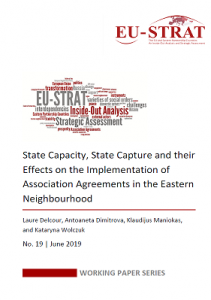Authors: Laure Delcour, Antoaneta Dimitrova, Klaudijus Maniokas, and Kataryna Wolczuk
Abstract:
 The Association Agreements signed with Georgia, Moldova and Ukraine envisage the creation of independent regulatory bodies in a number of sectors, with a view to creating a level playing field. These bodies, if functioning well, should limit the ability of rent-seeking elites (linked via political-business networks) to use political power to extract rents. This paper examines the relationship between capture of the state by rent-seeking elites (state capture) and capacity building for the implementation of Association Agreements. Empirically, it traces the establishment and functioning of the energy regulatory bodies required by the European Union’s acquis in the three associated countries. We find a differential pattern which corresponds to different levels in state capture, but also to different dynamics over time. While Ukraine has suffered the most from state capture and the effects of transfers of public assets to private wealth have been dramatic, especially in the energy sector, Georgia has not seen such effects. In Moldova, regulatory independence is recently more under pressure than it has been in the past. Overall, while all three countries have set up regulatory bodies as requested by the European Union, in practice the work of the regulator (especially in Moldova and Ukraine) continues to be undermined by political interference, selective application of legislation, and a lack of transparency. Energy regulators thereby remain susceptible to the influence of powerful interests. Therefore, we argue that without fundamental changes in the relationship between dominant elites and the political system, the creation of specific sectoral bodies is insufficient to ensure a level playing field.
The Association Agreements signed with Georgia, Moldova and Ukraine envisage the creation of independent regulatory bodies in a number of sectors, with a view to creating a level playing field. These bodies, if functioning well, should limit the ability of rent-seeking elites (linked via political-business networks) to use political power to extract rents. This paper examines the relationship between capture of the state by rent-seeking elites (state capture) and capacity building for the implementation of Association Agreements. Empirically, it traces the establishment and functioning of the energy regulatory bodies required by the European Union’s acquis in the three associated countries. We find a differential pattern which corresponds to different levels in state capture, but also to different dynamics over time. While Ukraine has suffered the most from state capture and the effects of transfers of public assets to private wealth have been dramatic, especially in the energy sector, Georgia has not seen such effects. In Moldova, regulatory independence is recently more under pressure than it has been in the past. Overall, while all three countries have set up regulatory bodies as requested by the European Union, in practice the work of the regulator (especially in Moldova and Ukraine) continues to be undermined by political interference, selective application of legislation, and a lack of transparency. Energy regulators thereby remain susceptible to the influence of powerful interests. Therefore, we argue that without fundamental changes in the relationship between dominant elites and the political system, the creation of specific sectoral bodies is insufficient to ensure a level playing field.
